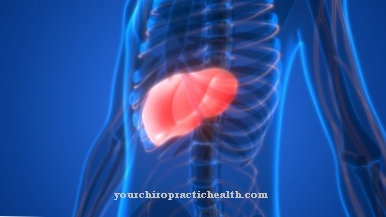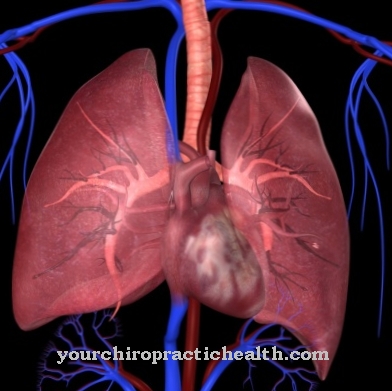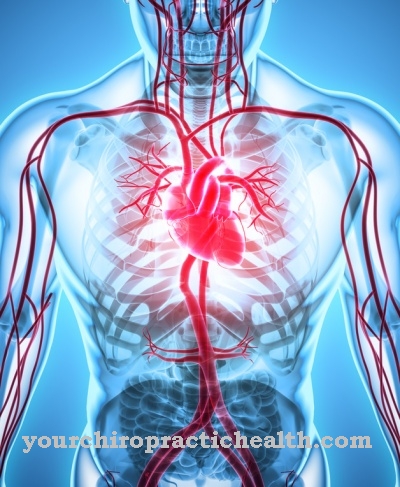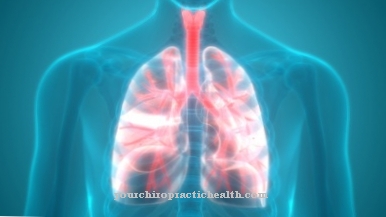The Abdominal press plays an important role in the human body because it is involved in many expulsion processes. The fact that the body can activate the abdominal press is primarily thanks to the abdominal and pelvic muscles and the diaphragm. However, if the abdominal press is used in an uncontrolled manner, complaints and diseases in the digestive tract can arise.
What is the belly press?

'Abdominal press' is a medical term that describes the application of pressure in the abdomen. The contraction of certain muscle groups creates increased pressure in the abdominal cavity. The abdominal and pelvic floor muscles as well as the diaphragm are involved in this intra-abdominal process.
While the abdominal press creates increased pressure in the abdomen, all organs are compressed here.In this way the contents of a hollow organ are expelled. This is the case, for example, when the stool is passed out of the rectum or when an expectant mother pushes the child out of the uterus during birth.
Since the abdominal muscles are most stressed during the natural process of the abdominal press, the exercises for training these muscles are usually called 'abdominal press' in German.
Function & task
In the human body, the abdominal press is used particularly when defecating and giving birth to a child. The increase in pressure in the abdominal cavity leads to the rectal evacuation being activated. During childbirth, the abdominal crunch is related to the delivery, in which the woman tries to push the child outwards by pressing.
However, the abdominal press also plays an important role in other processes: When coughing, when vomiting and to stabilize the spine when a lot of force is applied. Thanks to the abdominal press, the spine is relieved by up to 50% while lifting heavy weights. The abdominal press is also activated if there is difficulty urinating. In many cases it is only possible to pass urine with the help of an abdominal press. In order to create enough pressure intra-abdominally, the abdominal and pelvic floor muscles are tensed first.
In addition, other organs and muscle groups are also used in the abdominal press. So the vocal folds are closed during the abdominal press. The breathing muscles are also tensed in order to resist the closed glottis. At the same time, a lowering of the diaphragm is triggered.
The activation of different muscle groups is responsible for the fact that certain movements can be started at all. For many movement processes in the body, the abdominal and pelvic floor muscles have to work together. In the case of the abdominal press, these even have to interact with other muscle groups in order to trigger the pressure in the abdominal cavity and increase it.
You can find your medication here
➔ Medicines against tension and muscle painIllnesses & ailments
In the human digestive tract, the abdominal press is one of the conditions for complete emptying of the bowel. However, if it is used too heavily, it can in turn lead to digestive tract diseases or complaints. This is the case with hemorrhoids, for example. In principle, chronic intestinal problems are not life-threatening, but they can be very painful for those affected. Often they also feel severely impaired in their quality of life. The diseases hernia, constipation and encopresis are just three examples from a multitude of intestinal complaints.
A hernia is a passage of abdominal viscera through an opening in the abdominal wall. If the pressure in the abdomen increases too much as a result of an abdominal press, organs can be pressed against the gaps in the abdominal wall. It can happen that an organ or even several organs are pushed into this gap.
Often the abdominal press also ensures that the peritoneum turns inside out. This creates a channel from which loops of intestine can emerge. Overall, this disease occurs more frequently in men than in women because they have to do heavy, physical work more often at work. The symptoms are expressed by pulling pains at the break point. The irritated peritoneum can also cause nausea and vomiting.
In the case of constipation, also known as constipation in medical jargon, the bowel can only be emptied once within several days or weeks. The person concerned rarely feels an urge to go to the toilet. Going to the toilet can also be an excruciating endeavor for the person every time. The bowel movement is actually automatic. As soon as the rectum fills, the anus opens by itself. Now the abdominal press is used to force the intestinal contents outwards. However, if you press with too much force despite being constipated, you run the risk of suffering from hemorrhoids. Constipation and hemorrhoids are often closely related. Patients with hemorrhoids usually have a persistent urge to defecate even though there is no stool. This feeling leads him to push harder. This in turn leads to a worsening of the symptoms.
The enkropresis is the faecal defecation in children from the age of four who have actually already learned to defecate. Psychological stress or a delay in child development are suspected to be the causes of this disease. The latter can affect both the psychological and physical development of the child. It is not uncommon for children to have painful experiences during bowel movements, for example with constipation or hemorrhoids. Then the child avoids going to the toilet or pressing until it can no longer hold back the stool and finally empties the bowel in an uncontrolled manner.





.jpg)


















.jpg)



